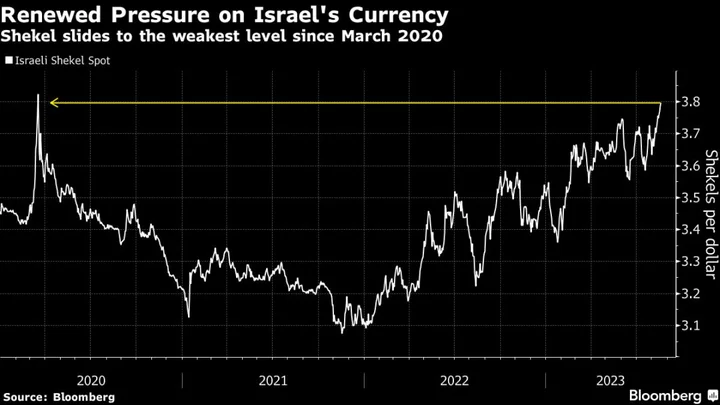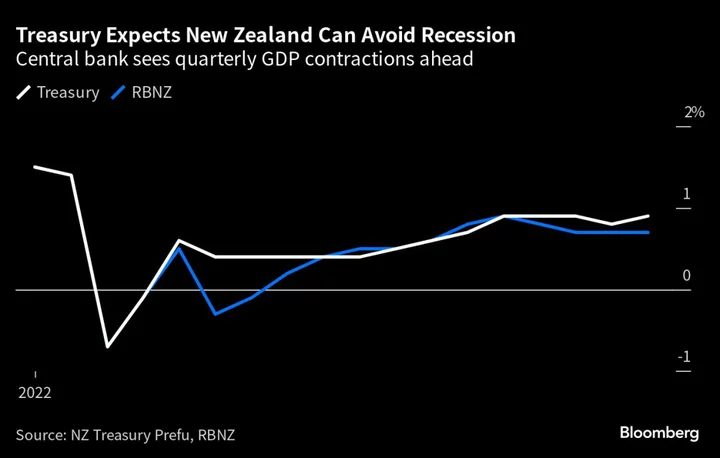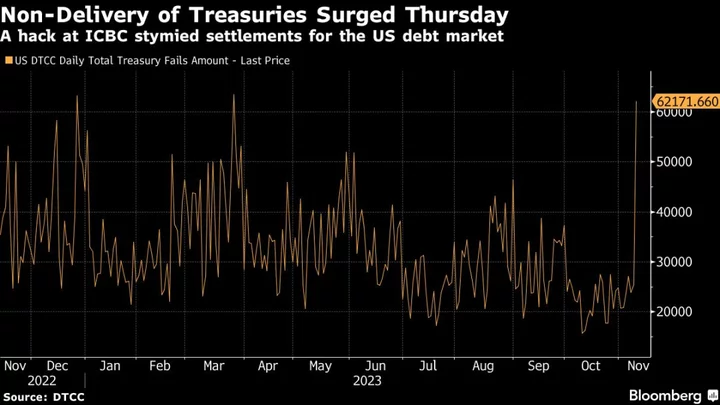When Fitch Ratings issued an optimistic report on Israel last week, it defied growing conventional wisdom that the government’s populist agenda is hacking away at the economy while driving capital, companies and talent abroad.
Breaking with naysayers at the other major credit assessors, Fitch affirmed Israel’s sovereign rating at A+ and signaled little worry over a planned judicial overhaul that’s unleashed seven months of unprecedented unrest.
In an interview, Cedric Berry, Fitch’s lead analyst on Israel, said he draws comfort from the combination of Israel’s economic resilience and the fractiousness of its politics. What’s more, Prime Minister Benjamin Netanyahu’s government “watered down” its effort to reduce judicial power, he said.
“Even if Israel’s government lasts four years, it’s unlikely that a similar coalition would be formed afterward, so it would take a very strong reform drive to inflict a significant amount of damage,” Berry said. “And we don’t think that’s where the government is headed.”
In addition, he dismissed concerns about a major departure of capital and talent from the high-tech industry, saying any such flight is expected to be limited and not enough to make a big impact.
“Even if there is a bit of movement outwards of talent and capital, there is still quite a lot of activity that will remain in Israel and be sufficient to drive the economy,” Berry said. “It’s always a question of scale.”
The reassuring tone of Fitch’s decision was a bigger surprise than its outcome, which kept Israel’s debt score at the same level it has at Moody’s Investors Service and one notch below the assessment of S&P Global Ratings. Still, the fifth-highest investment-grade ranking matches that of Saudi Arabia, the world’s biggest oil exporter and the largest economy in the Middle East.
‘Good News’
For Netanyahu, the “very good news” from Fitch was a vindication of policies he’s said are only trying to restrain judicial activism and won’t imperil Israel’s democracy or economy.
Parliament has already passed legislation that bars judges from overruling government decisions they deem unreasonable, and Netanyahu told Bloomberg this month that his next step will be to take more control over the selection of judges.
Netanyahu’s critics — among executives, protesters, investors and the opposition — are less sanguine. Since the legislature is controlled by the executive in Israel, they say, the judiciary is the only real check on politicians.
Unease over the steps taken by Israel’s most religious and nationalist government in the country’s history is playing out in the market.
Since the demonstrations took off, the shekel has depreciated to the weakest in more than three years in one of the worst performances among a basket of expanded major currencies. With a loss of more than 11% against the dollar since late January, it’s only ahead of Argentina’s peso, Turkey’s lira and the Russian ruble.
The market backlash doesn’t faze Fitch since currencies and stocks “tend to react more strongly than economic fundamentals,” which is what the company uses to examine a country’s sustainability, Berry said.
“One of the big questions for the future of Israel is whether uncertainty is temporary or a sign of a structural change in investor perception,” he said. “It would likely require a stronger and a more detrimental reform agenda from the government to structurally change that perception.”
The threat to Israel’s credit rankings from judicial plans has become such a sensitive point of contention that Netanyahu personally lobbied rating companies earlier this year, according to reports in local media. Berry wouldn’t say if he met the prime minister during a visit to Israel or what message Fitch may have received from officials.
A core part of Fitch’s argument is that the changes being made to the cabinet’s initial package — such as a proposal to refrain from granting to the government an automatic majority on the judge selection committee — “would make it difficult to take very hard-hitting measures to the judiciary.”
While critics have warned Israel faces risks similar to fallout in countries like Poland, which have also taken aim at overhauling the judicial system, Berry said they provide little guide or precedent to how Israel’s World Bank governance indicators might change, especially since the “scope of reform” may not be the same.
Fitch’s confidence came with a warning, however, that Israel’s governance indicator scores could be at more risk in case of “a massive change in the way judges are appointed with a very political agenda.”
Nowhere is anxiety about Israel’s future more evident than in its high-tech industry, the engine of the $520 billion economy that employs 14% of all workers but contributes an estimated quarter of all income tax.
Investments in the sector during the second quarter of 2023 were the lowest since 2018, and recent surveys found that more than two-thirds of Israeli startups have taken steps such as relocating employees and moving their cash reserves and headquarters abroad. Optimism over the outlook for the US venture capital market is in stark contrast with the downbeat view local investors take of Israel’s prospects.
But even there, Fitch sees a blip more than a permanent change, since Israel’s technology companies benefited disproportionately during and after the global pandemic.
“In our view, we are likely to see new investments in Israel when the global trends turn,” Berry said. “The key message here is that it’s not doomsday.”
For Israel’s credit profile to suffer, it would have to experience “a significant exodus of both talent and capital and that’s not something that we anticipate at this point,” he said.
(Updates shekel’s performance in 12th paragraph.)









